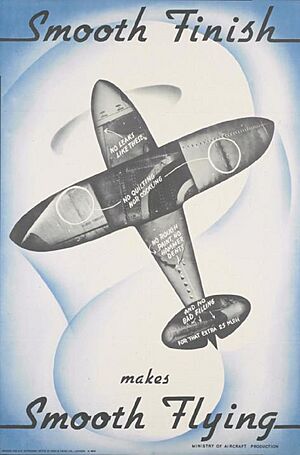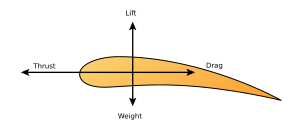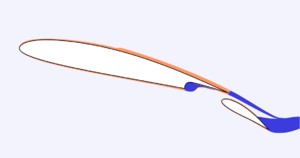Aerodynamics facts for kids
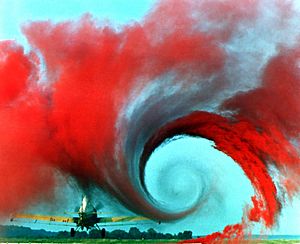
Aerodynamics is the study of how air moves, especially when it flows around a solid object like an airplane wing. The word comes from two Greek words: aerios (meaning "air") and dynamike (meaning "movement"). It's a big part of a science called fluid dynamics, which studies how all liquids and gases move.
Understanding aerodynamics is very important for designing and building airplanes, rockets, and even fast cars. Scientists and engineers use it to figure out how to make things fly or move through the air with less effort. They use tools like wind tunnels and powerful computer simulations to test their ideas. This helps them create safer, faster, and more efficient vehicles.
Contents
The Story of Aerodynamics
Even though the science of modern aerodynamics is only a few hundred years old, people have been using its principles for thousands of years. Ancient sailors used sails to catch the wind to power their boats, and windmills were used to grind grain. Stories of flight, like the Greek legend of Icarus and Daedalus, show that people have always dreamed of flying.
Early Discoveries
In 1726, Sir Isaac Newton was one of the first scientists to develop a theory about how air resists things moving through it. A few years later, in 1738, a mathematician named Daniel Bernoulli discovered something amazing. He found that when air moves faster, its pressure drops. This idea, now called Bernoulli's principle, is a key reason why airplane wings can create lift.
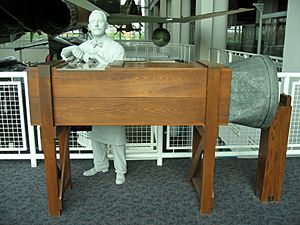
In 1799, Sir George Cayley was the first person to figure out the four main forces that act on a flying object: weight, lift, drag, and thrust. He understood how these forces had to balance for an aircraft to fly, which was a huge step toward making flight possible.
The First Flights
Using the knowledge from these early pioneers, inventors began building gliders and flying machines. Otto Lilienthal from Germany made over 2,000 successful glider flights in the 1890s. He designed thin, curved wings that were great at creating lift.
Building on all this work, two American brothers, Orville and Wilbur Wright, decided to build their own flying machine. They built a wind tunnel to test different wing shapes and figure out the best design. On December 17, 1903, they made history by flying the first successful powered airplane.
Flying Faster and Higher
As airplanes got faster, engineers faced new challenges. When a plane gets close to the speed of sound, the air around it starts to behave differently. This speed zone is called transonic flight. For a long time, people weren't sure if it was possible to fly faster than sound.
This challenge was known as the "sound barrier". Finally, in 1947, a pilot named Chuck Yeager flew the Bell X-1 aircraft faster than the speed of sound, breaking the barrier and opening up a new era of supersonic flight.
Today, engineers use powerful computers to simulate and design aircraft. Computational fluid dynamics (CFD) allows them to test how a plane will fly before it's even built, making flight safer and more advanced than ever.
The Four Forces of Flight
To understand how an airplane flies, you need to know about four basic forces. These forces are always at work when an object moves through the air.
- Lift is the upward force that pushes an airplane into the air. It is created by the shape of the wings. As air flows faster over the curved top of the wing and slower underneath, it creates a pressure difference that pushes the wing up.
- Drag is the force of air resistance that tries to slow an object down. It's the reason you feel the wind pushing against you when you ride a bike. Engineers try to make airplanes as smooth and streamlined as possible to reduce drag.
- Thrust is the force that pushes the airplane forward. In most planes, thrust is created by engines, which might be jet engines or propellers.
- Weight is the force of gravity pulling the airplane down toward the Earth.
For an airplane to fly at a constant speed and altitude, these forces must be in balance. Lift must be equal to weight, and thrust must be equal to drag.
Airflow at Different Speeds
The way air behaves changes a lot depending on how fast an object is moving. Scientists use the Mach number to measure this speed. Mach 1 is equal to the speed of sound.
Subsonic Flow
This is when the airflow is slower than the speed of sound (below Mach 1). Most passenger airplanes and small planes fly at subsonic speeds. The air in this regime is predictable and flows smoothly around the aircraft.
Transonic Flow
This is the tricky speed range right around the speed of sound, usually between Mach 0.8 and Mach 1.2. At these speeds, some of the air flowing over the wings may be supersonic, while the rest is subsonic. This can cause instability and increased drag.
Supersonic Flow
This is when the airflow is faster than the speed of sound (above Mach 1). When an object travels this fast, it creates shock waves, which are like the wake a boat leaves in water. These shock waves are what cause a loud "sonic boom" that can be heard on the ground. Fighter jets and the famous Concorde passenger jet flew at supersonic speeds.
Hypersonic Flow
This is for extremely high speeds, usually defined as being above Mach 5 (five times the speed of sound). Spacecraft re-entering Earth's atmosphere and advanced experimental aircraft travel at hypersonic speeds. At these speeds, the air gets so hot that it can glow and even change its chemical makeup.
Key Ideas in Aerodynamics
Besides the four forces and different speed regimes, here are a couple of other important ideas in aerodynamics.
Boundary Layers
Imagine a very thin layer of air that "sticks" to the surface of a moving object, like a wing. This is called the boundary layer. Inside this layer, the air slows down due to friction with the surface. Understanding the boundary layer is very important for engineers trying to reduce drag.
Turbulence
Sometimes, air flows in smooth, straight lines. This is called laminar flow. Other times, the air becomes messy, chaotic, and swirly. This is called turbulence. Think of the difference between a calm, slow-moving river and a fast-moving one with lots of rapids. Turbulence increases drag and can make for a bumpy flight. Engineers design wings to keep the airflow as smooth as possible.
Aerodynamics in Everyday Life
Aerodynamics isn't just for airplanes and rockets. It plays a role in many things we see and use every day.
Cars and Trucks
Car designers use aerodynamics to make cars more "slippery" so they can move through the air with less resistance. This reduces drag and helps the car use less fuel. Race cars use wings and spoilers not to lift them up, but to create downforce. This is like upside-down lift, pushing the car onto the track for better grip in corners.
Sports
Have you ever seen a soccer player make the ball curve, or a baseball pitcher throw a curveball? That's aerodynamics at work! When a ball spins as it flies through the air, it creates different air pressures on its sides. This force, called the Magnus effect, pushes the ball and makes it curve.
Buildings and Bridges
When designing very tall buildings or long bridges, engineers must think about how strong winds will affect them. They use principles of aerodynamics to make sure the structures are strong and stable enough to withstand the force of the wind.
See also
 In Spanish: Aerodinámica para niños
In Spanish: Aerodinámica para niños
- Aeronautics
- Aviation
- Computational fluid dynamics
- Fluid dynamics
- Insect flight – how bugs fly
 | Kyle Baker |
 | Joseph Yoakum |
 | Laura Wheeler Waring |
 | Henry Ossawa Tanner |


